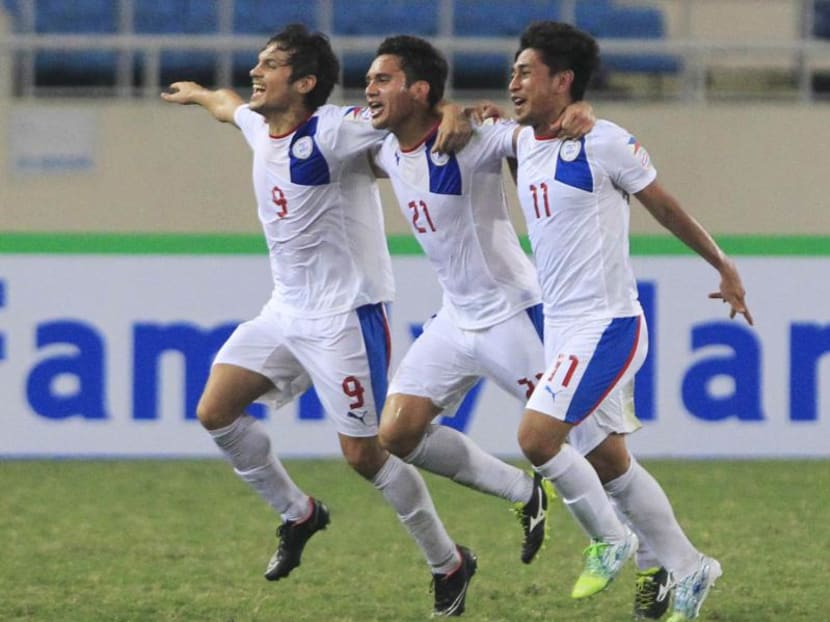AFF reinstates Philippines as Suzuki Cup co-host
DA NANG - The Philippines has been reinstated as co-host of this year’s Asean Football Federation (AFF) Suzuki Cup by the regional football body following a meeting of the AFF Council in Da Nang, Vietman, on Saturday.

Martin Steuble (C) of the Philippines celebrate with teammates Misagh Bahadoran (L) and Daisuke Sato after scoring against Indonesia during their Suzuki Cup Group A match at My Dinh Stadium in Hanoi in 2014. The Philippines will be co-hosting the 2016 edition of the football tournament with Myanmar. Photo: Reuters
DA NANG - The Philippines has been reinstated as co-host of this year’s Asean Football Federation (AFF) Suzuki Cup by the regional football body following a meeting of the AFF Council in Da Nang, Vietman, on Saturday.
This was after the Philippines Football Federation (PFF) showed that it had resolved all its stadium-related issues before the March 11 deadline that had been imposed by the AFF.
Three weeks ago, TODAY had reported that the Philippines were forced to withdraw as co-host of the Suzuki Cup, to be held from Nov 19 to Dec 17, after failing to meet AFF’s stadium criteria.
The PFF was supposed to host all Group B matches, with co-host Myanmar staging Group A but withdrew because they could not meet the competition’s requirement of a minimum 30,000-seater capacity stadium as the primary venue.
The PFF could only nominate the 15,000-seater Rizal Memorial Stadium as the tournament venue, as they were unable to secure a written stadium hire contract from the privately-owned Philippine Sports Stadium (PSS) — which can seat about 25,000 — on time.
The Football Associations of Singapore and Malaysia (FAS and FAM), and the Vietnam Football Federation (VFF) had expressed their interest to take over as co-hosts. The FAS - which co-hosted the 2014 tournament - and VFF subsequently withdrew their interest, leaving the FAM as the only candidate.
However, the AFF approved the Philippines once again as co-host alongside Myanmar after being presented with the contract between the PFF and the PSS, as well as a letter of guarantee from the Philippines Sports Commission.
The PSS will be the main venue of the Suzuki Cup while the Rizal Memorial Stadium - with a capacity of 12,500 - will be the secondary stadium.
This will be the first time that the Philippines and Myanmar will be hosting the biennial tournament.
“We are very glad to receive the support from the AFF Council and now we can move on and work towards hosting a successful Suzuki Cup,” said PFF general secretary Atty Edwin B Gastanes in a media release on the AFF website.
“Both hosts will have a lot of work to do as this is the first time that both countries will be hosting the AFF Suzuki Cup and we have to make sure that we do everything possible.”
PFF president Mariano Araneta added: “We feel confident that we can draw the attendance required and we are already taking steps to make sure that we go in the right direction.
“The AFF Suzuki Cup, for us, is more important than the World Cup qualifiers, so we are confident that we can deliver what is expected.”
The AFF did not respond to reports of any proposed changes to the tournament format for the 2018 edition of the tournament.
A football news website, Football Asia Channel claimed last Friday that the AFF is exploring changing the group stage round-robin format, to a home-and-away system.
The proposal is for group matches to be played both home and away, instead of playing it in two hosting countries where attendance for matches that do not involve the hosts are often poor.
The proposed new move will generate more international matches for participating countries, and possibly create more broadcast rights revenue for the AFF. It will also give fans more opportunities to watch their national teams in action at home.





